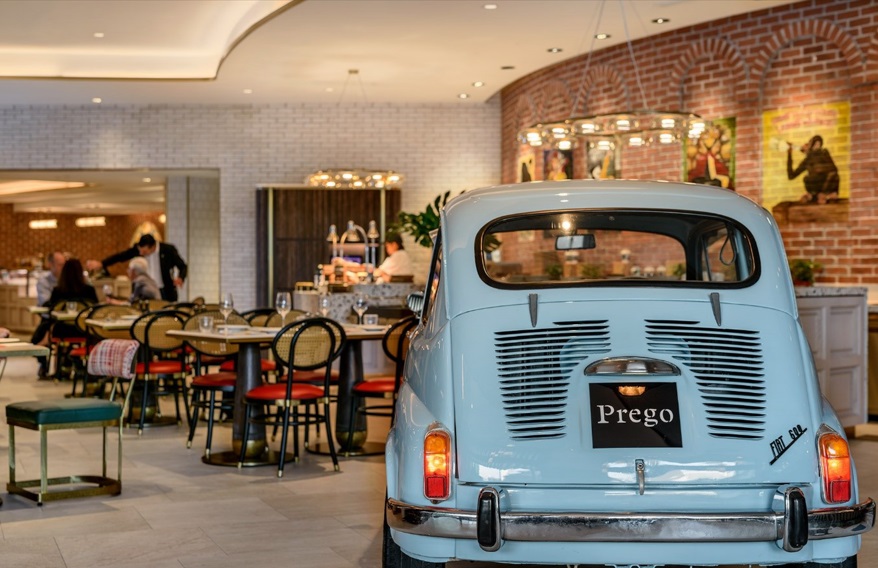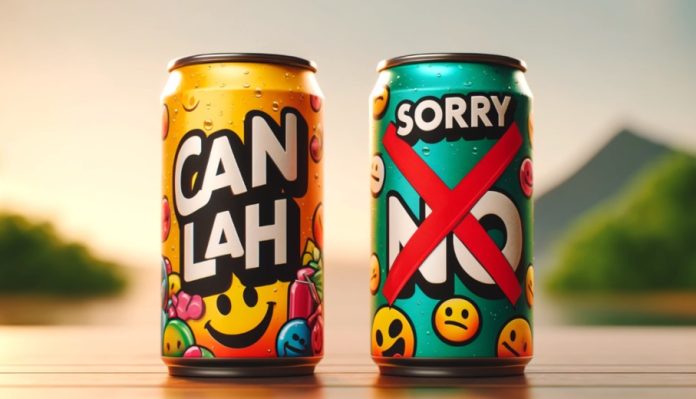By Avi Liran
A refreshing guide from one of the top motivational and entertaining speakers in Asia on how to turn those frustrating “NOs” into delightful “YES”?
When customers make a request, they usually want to hear that magic word “yes.” So shouldn’t businesses focus on exploring ways to satisfy them? And if we really must say “no,” couldn’t we think about sweetening the pill? Well…yes! In fact, the Singaporeans have a word for it.
As customers, we’ve all been there, denied a reasonable request by a rigid no, with excuses about companies’ internal rules. Can we really get what we truly desire (all the time)?
In preparation for delivering the “ Chief Delighting Officer1” course for the top 85 leaders of Fairmont and Swissotel in Singapore, I embarked on a unique learning journey of their unique culture. I was invited to a half-day internal workshop called “Can-Lah,” a brilliant program masterminded by the then Managing Director, Marcus Hanna (now Vice President of Operations Pacific Sofitel, MGallery & Emblems).

In the realm of luxury hospitality, where exceeding guest expectations is paramount, the “Can-Lah” spirit becomes a powerful tool. This simple, yet potent, “Singlish” (Singaporean-English slang) phrase was designed by these hotels to go beyond mere politeness. It embodies a “can-do” attitude and a willingness to go the extra mile, ensuring that guests feel truly delighted.
Instead of rigid SOPs (standard operating procedures) being the sole guide, “Can-Lah” empowers team members to make guest needs their top priority. This doesn’t translate to a blanket “yes” to every request, of course. Illegal, immoral, disrespectful, or unreasonable demands would still require a firm, yet graceful, “no.” However, for everything else, the “Can-Lah” spirit encourages creative problem-solving and a focus on exceeding expectations or at least meeting them consistently. It’s about saying “yes” from the heart.
Unsure about a request? “Can-Lah” encourages escalation, not denial. Let the guest know you’re their champion and will strive to fulfill their wish and check with your manager for ways to make the guest feel supported with a creative solution.
A Cheeseburger In An Italian Restaurant?
Imagine this. You’re craving a juicy cheeseburger at Fairmont’s renowned Italian restaurant, Prego. While a cheeseburger isn’t on the menu, the “Can-Lah” spirit kicks in. Instead of a disappointing “I am so sorry, I regret we do not have it on the menu,” the server embraces the challenge with a smile. “Certainly, sir!” they might say. “While we specialize in delectable Italian cuisine, we understand sometimes cravings hit differently. Let me bring you the room service menu (or that of one of the other hotel outlets) and we’ll gladly place your order for you. It may take a bit longer to arrive, so, in the meantime, perhaps you’d enjoy one of our phenomenal antipasti selections?”
The “Yes, And …” Principle
In improvisational theatre, the “Yes, and…” principle is the foundation for creating scenes and stories together. It’s about building on what your fellow imptrovisers offer, rather than blocking or shutting down ideas.
There are people who prefer to say ‘yes’ and there are people who prefer to say ‘no’. Those who say ‘yes’ are rewarded by the adventures they have. Those who say ‘no’ are rewarded by the safety they achieve.” – Keith Johnstone
This concept has been adopted in various fields, including business and personal development. First, you have the “yes,” which is accepting the reality presented, rather than blocking it. Then, add the “and …”, building upon the “yes” by adding the latest information or ideas. This nonjudgmental approach promotes creativity, collaboration, and adaptability, turning simple acceptance into opportunities for innovation, growth and, in the “Can-La” concept, into superior customer experience.
Turning “No” Into “Magnificent”: A Rooftop Wedding Proposal In Singapore

A standout tale from that day illustrated “Can-Lah” in action, gracefully navigating a decline due to safety protocols. A gentleman envisioned his marriage proposal to his fiancee taking place on Swissotel’s 73rd – floor apex, dreaming of the beautiful Singapore skyline as the backdrop. The reply was both warm and ingenious: “Sir, to craft an unforgettable moment for your special occasion we’ve arranged a secluded space on the 72nd floor, offering a splendid view of Marina Bay, with the champagne courtesy of the house. Regrettably, the rooftop and helipad must remain unoccupied for safety reasons.”
The “And, No” Principle
By employing “Can-Lah” boundaries, we offer a creative and adaptable solution, fostering a sense of safety and understanding that allows the other party to accept the negative response more readily.
The 72nd floor story from the “Can-Lah” boundaries narrative resonated with Raymond Van Driel, a world-renowned advanced improvisation trainer. He linked it to the concept of the “And, no” principle. This principle emphasizes acknowledging the other person’s request by adding a practical alternative solution first (the “and”), while still delivering a clear and firm decline (the “no”). By employing “Can-Lah” boundaries, we offer a creative and adaptable solution, fostering a sense of safety and understanding that allows the other party to accept the negative response more readily. In this instance, the “and” exceeded expectations, as the safe alternative was far more delightful than the guest’s original request.
Doing The Right Thing Sometimes Requires A “No”
Yeo Yee Ching, the former Head of Client Services at BNP Paribas Securities Services, and previously Relationship Manager at ClearStream, was known to her clients as their champion. When a client’s claim was valid, she would escalate it and secure the appropriate waiver. She always chose to do the right thing, establishing long-term trust and building strong personal relationships with all her clients.
Even when “No” was the inevitable answer, Ching delivered it with a touch of positivity. She personalized her responses and often used humor, sharing the facts and showing empathy for their loss due to their error. She navigated unreasonable client demands with the finesse of a cat walking a tightrope, never allowing her clients to turn their own blunders into her company’s expense.
Her clients adored her, despite not always getting what they wanted. It’s like the quote (often dubiously) attributed to Winston Churchill: “She could tell you to go to hell in such a way that you would look forward to the trip.”
Missed Opportunities For “Can-Lah”
When you have experienced the “Can-Lah” spirit firsthand, its absence can be frustrating. During a recent stay at a luxurious five-star hotel in one of the biggest cities in Southeast Asia, I encountered rigid and unkind situations. While working on my emails in the club lounge, I craved a specific dish from the main restaurant.
Unfortunately, the initial response of the polite lounge hostess was, “I am so sorry, sir, we are not allowed to do this here,” followed by a suggestion to relocate downstairs. The empty lounge and readily available staff of three made this approach feel strange. After all, I would gladly pay for it.
Similarly, a post-breakfast request for a simple French toast from the à la carte menu post-12 pm faced initial resistance. Considering that the chef was still operational, the request to crack two eggs seemed reasonable. Again, I offered to pay for it. In both instances, while the requests were eventually fulfilled after escalation, the “We will do it for you, but this is the last time” disclaimer left a negative impression.
These interactions lacked the essence of “Can-Lah” attitude, with the unwillingness to go even an inch, not to mention to go the extra mile and create a truly delightful experience. A simple phone call from the lounge or minor flexibility could have significantly enhanced these encounters.

Before my departure, I enquired about a 30-minute massage, due to limited time. Despite there being a willing and available therapist, the receptionist said, “I am sorry, we have a one-hour-minimum policy.” After a call to his manager, he said, “We can accommodate it this time, but you still have to pay for a full hour.” His comment further reinforced the transactional feel.
While my stay was nice, these transactional experiences focusing on SOPs left me with a bitter taste. Instead of feeling like a valued guest, someone who would readily praise the staff and hotel on Tripadvisor, I left feeling less inclined to return or recommend it.
When disempowering and rigid SOPs get in the way, it is like telling a musician to play without hearing the applause.
These recent experiences weren’t necessarily a reflection on the front-line staff, who usually love to delight guests and flourish when creating happy connections and receiving compliments, but rather an indicator of a rigid and transactional service culture within the establishment.
When disempowering and rigid SOPs get in the way, it is like telling a musician to play without hearing the applause. They miss the joy of the sweet rewards of appreciation, “thank you” letters, and glowing Tripadvisor reviews. Instead, they face the draining, bitter expressions of disappointed guests every day.
When the Food & Beverage Director expressed his disappointment that the team did not display the value of the famous “Malasakit,” a Filipino concept embodying empathy, concern, and taking action to address others’ needs, I immediately recalled and shared the “Can-Lah” program with him. With a new five-star hotel opening just across the road, sticking rigidly to outdated SOPs will only drive guests to the competition.
How To Create And Maintain “Can-Lah” Attitude
Adopting the “Can-Lah” ethos does not happen by itself. You must invest in it.
- Start at the top: The initiative needs to be more than just a policy. It should pulse through the organization’s veins, championed and demonstrated by the leadership. From day one to daily huddles, expectations should be clear, supported by the full weight of resources committed to the cause.
- Psychological safety: Weave a tapestry of open and agile dialogue, where frontliners can comfortably voice their worries and receive prompt feedback, knitting a loop that closes with clarity on action taken and rules reshaped, ensuring that they are equipped to craft even more delightful experiences.
- Empowerment: Grant them decision-making authority within reasonable boundaries, and a rapid escalation process when needed.
- Engaging training: Make learning a journey where employees become “Can-Lah” champions. Craft engaging content that blends interactive sessions with real-life success stories and even humorous tales of overcoming challenges to ensure that the concept sticks.
- Recognition and reward: Highlight successes of everyday acts of delighting customers to reinforce positive behaviors and motivate others. Celebrate progress by acknowledging improvement and effort, not simply perfect outcomes.

The Benefits Of “Can-Lah” Spirit
In the process of crafting First Time Leadership2 with my co-writer, Daniel Lee, a narrative emerged from our interviews with 220 top leaders, revealing a poignant insight, particularly among female leaders, who comprised over half of our conversations. A recurring theme was the self-imposed barrier of waiting for perfection before stepping into leadership roles. This resonated deeply with one leader’s story, where, despite being ready years earlier, she hesitated to step forward. The interim leader’s failure, contrasted with her peers’ encouragement, eventually propelled her to seize the role, underscoring a crucial lesson of the need to “Can-Lah.” Leadership isn’t about personal perfection; no one can be 100 per cent ready before taking a challenge.
- Saying “yes” to new experiences can lead to unexpected growth and positive outcomes. This aligns with the “Can-Lah” spirit of embracing possibilities and going beyond limitations. Release your fears and dare to seize opportunities.
- Problem-solving creativity: The “Can-Lah” mentality is not just about saying “yes.” Often, it pushes us to find creative solutions to problems. It encourages resourcefulness and ingenuity in overcoming challenges. Do not be limited by existing rules, SOPs, or structures; explore ways to overcome obstacles and achieve goals.
- Empowerment and initiative: A “Can-Lah” culture empowers team members to take ownership and make decisions. It fosters a spirit of initiative and encourages individuals to take calculated risks. Empowerment gives employees a sense of autonomy. Feeling control over their work leads to higher senses of ownership, motivation, and engagement.
- Customer-focused innovation: While hospitality emphasizes guest delight, “Can-Lah” can apply to any customer-centric industry. It means looking beyond the standard offering and finding ways to exceed customer expectations and create innovative solutions.
- Adaptability and resilience: The world is constantly changing. “Can-Lah” encourages flexibility and the ability to adapt to new situations and challenges. It is about finding ways to move forward, even when faced with setbacks, to create a better offering that will keep you ahead of the competition.
- Empowering cross-functional collaboration: “Can-Lah” encourages and fuels a spirit of helping each other to work together to find solutions across silos to delight the customers.
Conclusion
Embracing the “Can-Lah” spirit turns refusals into opportunities, blending creativity with practicality. Leaders can inspire their teams to exceed expectations by adopting the agile and playful improv principles of a “Yes, and …” mindset, fostering a problem-solving attitude that prioritizes customer satisfaction while maintaining boundaries.
The “And, no” principle is equally important for setting effective and delightful boundaries. By acknowledging a request and offering an alternative first, it ensures that even a “no” is delivered with positivity and respect.
These approaches, though rooted in hospitality, can enhance customer loyalty, employee empowerment, and organizational resilience in any industry, creating a workplace where every challenge is met with a smile and a willingness to go the extra mile.
From now onwards, say “Can-Lah!”











